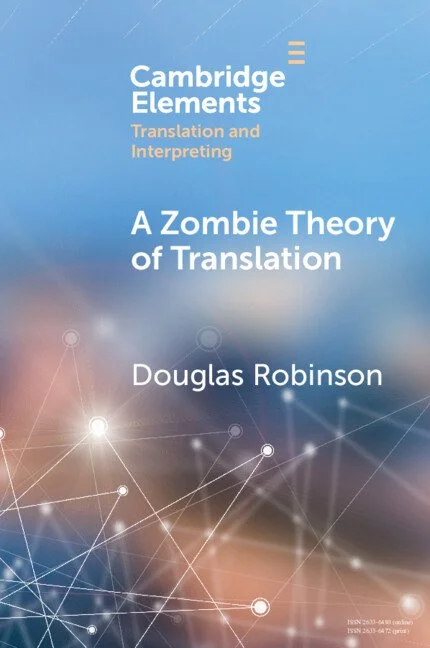Welcome!
The full quote in that site title is from James Joyce’s Finnegans Wake: “Translout that gaswind into turfish, Teague, that’s a good bog and you, Thady, poliss it off, there’s a nateswipe, on to your blottom pulper.”
I like the quote, and use it here, because I’m a literary and experimental translator, and I have a recently published book titled Lessons Experimental Translators Can Learn from Finnegans Wake—but I also write quirky novels that play with words and styles and epistemologies along Joycean lines.
I’m Doug. I publish under the more formal name Douglas Robinson, but you can call me Doug.
Come on in to check out my creative works: a transcreation, a pseudotranslation, two original novels, and two academic books in the critical/creative mode (the Zombie book featuring an original zombie short story by me).
New Novel!
You-Gin One-Gin!
Sunrise from my balcony in Shenzhen, PRC
“Both of these books — each one an exegetical, tragicomic tour de force — replete with their many points of entrance, departure, and interpretation, are impressively erudite, playful, and enjoyable. Gulliver’s happy homecoming demands an agonic rupture with the familiar, and the last days of Maiju Lassila are, ultimately, really only the first ones.”
—Brendan Riley, reviewing Gulliver’s Voyage to Phantomimia and The Last Days of Maiju Lassila in The Los Angeles Review of Books (2/12/2023)
“[Insecticide] will especially delight readers who appreciate intricate blends of satire, history, speculative events, and sci-fi social scenarios in their literature; especially those attracted to works which challenge pat categorization.
”Libraries that choose Insecticide: A Republican Romance for its different form of political and social observation will find it easy to recommend to book clubs seeking out-of-the-box thinking and scenarios that lend to discussion and laughter in equal measure.”
—Diane Donovan, reviewing Insecticide: A Republican Romance in Midwest Book Review
“Insecticide is an ambitious and thought-provoking read that successfully merges historical context with fantasy and political satire elements. Robinson’s narrative challenges and entertains, making readers question the nature of history and power. This book is highly recommended for fans of alternate history and political thrillers and those who appreciate a touch of the supernatural in their reading. It’s particularly suited for readers who enjoy dense, layered narratives that offer more than just a straightforward plot but rather a complex tapestry of ideas and imagination.”
—5-star review at Literary Titan
“Trust me when I say: You are going to be laughing out loud with this outlandish political parody. … At turns nonsensical, sarcastic, shocking, and gut-busting, this bold travesty will hook you. Fans of political satire will adore this gloriously funny caricature of modern politics. Those looking for a break from real-world politics will find this a delicious departure, and fiction buffs will enjoy the hilarity with an audacious and ironic romance at its heart.”
Lisa Parker Hayreh, reviewing Insecticide: A Republican Romance in Independent Book Review
“In this satire [Insecticide], sham news articles, memos, prose, and dialogue transcriptions follow the fantastical fortunes of the George H.W. Bush presidential dynasty, whose members are human-alien hybrids in thrall to insect extraterrestrials and opposed by a group of talking fish and others. …
“An engaging and scabrous alternative-universe farce about the American government.
Books
Zeta Books €22
Amazon $35
This began as an English translation of a posthumous novel left unfinished at his death by the great Finnish modernist novelist Volter Kilpi (1874-1939) .
It changed as I translated it—mainly because Kilpi wrote a preface claiming that the original English manuscript, apparently written by Gulliver himself, appeared on his desk in the University of Turku library, and he translated it into Finnish. And I started thinking: why don’t I pretend to have found the same manuscript and EDITED it in the original English?
To that end I translated it into Swiftian 18th-century English; continued the unfinished novel to the end Kilpi was projecting; added an editor’s preface by an obviously insane “Douglas Robinson”; wrote a vicious attack on the “hoax” that “Douglas Robinson” was supposedly perpetrating, by a fictitious Finnish critic named Julius Nyrkki (his surname means “Fist”), and so on.
I also decided to call it a “transcreation” on the book cover and inside the covers pretend to have not transcreated it but edited it .
And I wrote over 100 footnotes undermining the claim that the book was written in the eighteenth century—but never suggesting that Volter Kilpi actually wrote it in 1938.
Transcreation, 2020
This is a different kind of translational experiment: I wrote an original novel and pretended it was a translation from an unpublished novel written in Finnish by J. I. Vatanen in 1922.
But I didn’t JUST pretend. As you see on the left, I call it both a “memoir-novel” by J. I. Vatanen and a “pseudotranslation by Douglas Robinson.”
Inside the covers I do pretend that I translated it—that the original Finnish novel exists in the Finnish National Library, in manuscript, with “1922” scribbled on the first page in pencil—and as in the Gulliver transcreation, I also write a series of footnotes pointing out anachronisms that would appear to make it impossible for it to have been written in or before 1922.
The idea is to keep the reader guessing—as the kind of epistemological play that is where the novel began historically as a pseudomemoir: François Rabelais’s Gargantua and Pantagruel (1530s), Miguel Cervantes de Saavedra’s Don Quixote (1605, 1615).
Some readers don’t enjoy being pushed to guess between possible and likely but mutually exclusive alternatives. This book drove the Kirkus reviewer out of his tiny mind with rage.
Others, fortunately, enjoy it:
“TWO RECENT WORKS of translation — or, more specifically, of ‘transcreation’ and ‘pseudotranslation’ — by scholar Douglas Robinson [Gulliver’s Voyage to Phantomimia and The Last Days of Maiju Lassila] offer profound, multifaceted excursions into Finnish literature, literary history, criticism, and intertextual theory.” (Brendan Riley, LARB)
Pseudotranslation, 2022
Original Novel, 2024
Disclaimer: This is a work of fiction. It ain’t history. None of this happened. Yes, technically, most of the incidents are inspired by books and websites claiming to tell the “truth” about the Bushes and right-wing politics in the U.S, but let’s get real-it’s all made up.
After all, the novel suggests that W. Averell “Dogsbody” Harriman convinced Prescott Bush to set up a new Republic of Texas in 1931. That obviously didn’t happen. None of it did.
So, a boilerplate work-of-fiction disclaimer for us would include at least the following: Prescott Bush wasn’t a closet Nazi, George Bush the Elder wasn’t a CIA tool, George Bush the Younger wasn’t an early cloning experiment gone bad, and Dogsbody Harriman wasn’t a giant 10,000-year-old bug from under the sea. Abraham Lincoln isn’t still alive, chilling at the bottom of a lake in Texas with his devil-water-cow Bessie. Lincoln was never a giant beetle from ancient Lemuria. And, of course, a spray can of insecticide decidedly did not wipe out all reality at the stroke of midnight, 1999. Y2K bug our asses!
In short, don’t believe a word you read in this book.
Bioblurb on the back cover: Douglas Robinson is neither a former Professor of Ichthyorhetoric at Liberal State University in Kansas (a land-locked state!) nor sadly deceased. Nor is he the author of The Seventeen Most Explosive Ichthyotopoi or the best-selling comic book Fish Rhetoric for Dummies. He is certainly not the celebrated host of the podcast Why Fish Argue (And Why You Should Care). His previous original novel with Atmosphere Press was a pseudotranslation of J. I. Vatanen’s The Last Days of Maiju Lassila.











